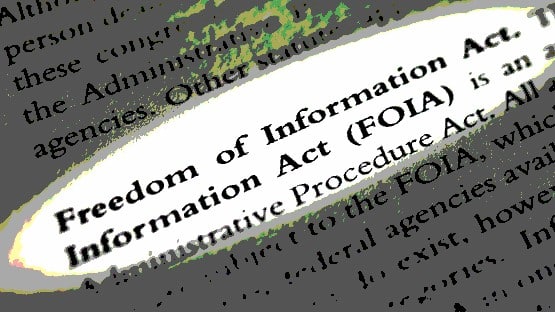
A state judge sided with Augusta County in a suit challenging the county’s denial of a Freedom of Information Act request that had been filed to obtain a recording of a March 20 Board of Supervisors closed session.
District Court Judge Rupen R. Shah, in an opinion handed down on Thursday, ruled that the recording is not subject to FOIA because it was made by South River Supervisor Scott Seaton for Seaton’s own purposes, and is therefore “not a record of the agency.”
Shah also accepted the county’s contention that the Board of Supervisors had legally used the FOIA exemption to go into closed session, which was held to discuss the resignation of Steven Morelli from the South River seat, opining that Morelli’s resignation, tendered the morning of the BOS meeting, was still revocable under state law, and that the board could thus meet outside of public scrutiny to discuss possible discipline of Morelli because he was still at the time of the closed session a board member.
“If a public body has the authority to censure, reprimand or otherwise discipline a fellow member of the elected body, then it may exercise this exemption to discuss the performance and subsequent discipline of the member. If no such authority exists, then the exemption is not applicable,” Shah wrote in his opinion.
“The public officer who was to be discussed had tendered his resignation prior to the meeting. However, acceptance of that resignation was not done by the board, and the resignation was revocable. The Augusta County Board did go in closed session for the matter for its own member who had resigned and not for any other board or agency. Had the member not resigned, or had the Augusta County Board of Supervisors taken any disciplinary actions or discussed the reprimand of the member, that would be requiring a public scrutiny and certainly be subject to mandamus, as that should be brought out to the voters for their consideration. However, in the case on hand, neither of those happened. The member resigned, and the Board did not take any other actions about that member,” Shah wrote.
I filed the suit against Augusta County on Aug. 23 after the county denied my request for access to the recording made under the state FOIA law on Aug. 21.
At issue has been the legality of the use of the state FOIA law to hold a closed session to discuss the resignation of Morelli, who reportedly stepped down after sexual-harassment allegations involving county employees came to light.
Holding this discussion in closed session, rather than in an open public session, appears to have been an attempt by the Board of Supervisors to simply avoid having a potentially embarrassing matter for the county and specifically for Morelli to come to light, and indeed public comments from the board’s chair, Michael Shull, who acknowledged in July the questions being directed at him and other board members over the Morelli resignation, would seem to bear that out.
Shah, in his ruling, addressed directly the question on that point, in a lengthy discussion of “the public policy behind the creation of exemptions for certain public records and meetings generally.”
“In no instance are the exemptions created purely for the convenience of the public body, or to allow a public body to keep somewhat embarrassing or sensitive issues out of the public light. Instead, each of the records and meetings exemptions was enacted to benefit the public in some way,” Shah wrote.
“The exemption appears to be designed to protect the privacy of a public officer, appointee or employee when discussing particular issues over which a public body has direct control and supervision. Public policy seems to dictate that discussions of an elected public officer’s handling of business and decisions related to the public business should be held in open session. An officer is elected by the citizens he represents, and oftentimes the only recourse for unpopular actions or positions is at the polls, where citizens vote to retain an incumbent or to elect a new representative,” Shah wrote.
“In most instances, public officers of an elected board have little or no authority to manage the day-to-day performance of fellow officers on the same board. A public officer chooses to place himself in the public light by running for office, and public scrutiny of his performance is an important part of the democratic process. If such discussion by fellow members of the elected body is held out of the public view, then the only people who have the actual power to remove a public officer – the voters – would be kept in the dark and not be able to make an informed decision at the next election,” Shah wrote.
While it may appear that this is exactly what the Board of Supervisors was doing in going into closed session to discuss the Morelli resignation, Shah effectively carved out a new exemption under FOIA that would allow public bodies to simply state ahead of time that they’re going to discuss discipline of an elected official, then certify such afterward, to get around having to have uncomfortable discussions about the actions, policy positions or alleged misdeeds of an official in a public setting.
“Discussion or criticism about the prudence of a particular public officer’s opinions or actions as they relate to the public business may be the essence of the discussions that FOlA was designed to keep in the public light,” Shah wrote. “Exemptions are generally created so that a public body may hold certain discussions that are necessary for its transaction of the public business, but that public policy allows to be held out of the public view. If a public body has no authority to discipline or censure one of its public officers, then such a discussion by the public body is not necessary, and public policy dictates that such a discussion take place at an open meeting.
“The relevant piece of the analysis for any closed session to be held under (the state FOIA law) is whether the public body retains some level of control over the individual whom it wishes to discuss. This was clearly articulated in the employer/employee context. However, the same analysis for determining the issue of control holds true when examining whether the exemption applies to a discussion of a public officer or appointee of a public body,” Shah wrote.
Full text of the Oct. 12 opinion in the Graham v. Augusta County FOIA case

Comes now, Plaintiff Chris Graham, represented Pro Se. and the respondent Country of Augusta, represented by Rosalie Fessier Esq. on a petition of “Mandamus” asking the Court to intervene and order the respondent to release the recording done by one of the members of Augusta County Board of Supervisors of a closed session of the board dated March 20th, 2023. The hearing was scheduled for September 5, 2023, at 11;30am. Considering the parties and witnesses being known to the Court, The Court did receive the waiver of disqualification in writing from both sides and the witnesses. All parties agreed to have the case heard by the undersigned Judge and signed the waiver.
Witnesses were placed under oath. There was a motion for separation of witnesses by the respondent. The witnesses were excluded from the Court with an instruction from the Court not to discuss the case with anyone and that they will be called as and when needed by either side.
Before the hearing began, both sides laid their case outline in the opening statements. Following exhibits were received by the Court ahead of any testimony, by consent of both sides.
- Plaintiff’s exhibit 1 FOIA Council opinion A-17-03
- Respondent’s exhibit 1 -Va code 2.2-3711
- Respondent’s exhibit 2 -Va code 19.2-67
- Respondent’s exhibit 3 -Va code 24.2-226
- Respondent’s exhibit 4 -Va code 2.2-3705.1
- Respondent’s exhibit 5 -Va code 2.2-3712
- Respondent’s exhibit 6 -Minutes of the meeting of March 20, 2023
The Plaintiff called Dr. Seaton to the stand and Dr. Seaton testified under oath that he did record the closed-door session (that is closed to the public) of the Augusta County Board of Supervisors on March 20, 2023. That he did not take anyone else’s consent to record, nor did he inform anyone else at the time of recording that he is recording everyone in the meeting. Dr. Seaton testified that he had recorded 26 or 27 of those meetings. Dr. Seaton said he has provided the copies of those recordings to one of the local FBI agents. Dr. Seaton also admitted sending copies of those recordings to one of the agencies in Washington D.C. Dr. Seaton testified that he had made those recordings for his notes. He testified that the recording in his opinion should be released to the public. Plaintiff rested his case in chief.
Respondent’s attorney Ms. Fessier, called Mr. Timothy Fitzgerald, the Augusta County Administrator. In sworn lestimony he restified that the Augusta County Board under the provisions of the Va code section 2.2-3711(A) (1) went in the closed session with proper procedure. He also informed the Court that Dr. Seaton had seconded both motions. The motion to go in the closed session was made by Mr. Slaven and was seconded by Dr. Seaton. Upon concluding the discussion, the motion to come out of the closed session was made by Mr. Wells and was seconded by Dr. Seaton.
Mrs. Fessier argued that the County went into the closed session, after the tender of the resignation of one of the Board members. However, the Board had not had a chance to accept that resignation. The resigning board member had time to withdraw that resignation and was revocable until the midnight of the day when it was tendered. (Va code: 24.2-226)
The FOlA Advisory Council opinion AO-17-03 was reviewed by the Court and it states:
When the Virginia Freedom of Information Act (FOIA) would allow an elected Board to meet in closed session pursuant to subdivision A 1 of § 2.2-3711 of the Code of Virginia to discuss whether and how to formally censure, reprimand, or otherwise discipline one of its, if the board has no lawful power to formally censure, reprimand, or otherwise discipline a member of another board or agency of the government than that discussion is not covered by the exemption. Subsection A of § 2.2-3707 requires that all meetings of public bodies shall be open, except as provided in § 2.2-3711. Subdivision A 1 of § 2.2-3711 allows a public body to convene in closed session for the discussion, consideration or interviews of prospective candidates for employment; assignment, appointment, promotion, performance, demotion, salaries, disciplining or resignation of specific public officers, appointees or employees of any public body; and evaluation of performance of departments or public institutions of higher education where such evaluation will necessarily involve discussion of the performance of specific individuals.
The Opinion is clear that Subsection B of § 2.2-3700 provides that the provisions of FOlA shall be liberally construed to promote an increased awareness by all persons of governmental activities and afford every opportunity to citizens to witness the operations of government. Any exemption from public access to records or meetings shall be narrowly construed. The issue discussed in the opinion is whether the exemption at subdivision A 1 of § 2.2-3711 should be interpreted as to allow an elected board to discuss the disciplining of one of its members when that board does not have any formal powers of discipline over that individual.
The Office of the Attorney General of Virginia has opined that a city council may not use the exemption to discuss specific city council employees other than those directly appointed by the council. In that fact scenario, the city council’s charter allowed for it to appoint a city manager, city clerk and city attorney. The city manager was given the authority to appoint, supervise and remove all other city employees. The Attorney General found that while the term “employee” was not defined by FOlA, four elements at common law determine the existence of an employer/employee relationship: (i) the employer’s selection and engagement of the employee; (il) the payment of wages to the employee; (ili) the employer’s retention of the power of dismissal; and (iv) the employer’s retention of the power of control of the employee.
The Attorney General found that the crucial question of control was whether the employer had the right to control not merely the results but also the progress, details, means and methods of the work. This element of control did not exist between the city council and the employees hired by the city manager; therefore, the city council could not go into closed session to discuss individuals with whom it did not have an employer/employee relationship.
This opinion was mentioned again two years later, when the Attorney General opined that the phrase “employees of any public body” could not be narrowly construed to be synonymous with the phrase “employees of any locality.”
These two opinions dealt with the interpretation of the phrase “employee of any public body” in subdivision A 1 of § 2.2-3711. However, the exemption also applies to discussions of specific public officers and appointees of any public body. To answer the current question, one must determine which public officers are subject to the exemption, since a public officer or appointee is not necessarily an employee. Like the term “employee,” the term “public officer” is not defined by FOlA. Where no applicable statutory definition of a term exists, it must be given its ordinary meaning, considering the context in which it is used. Black’s Law Dictionary refers to an officer, as used in a public affairs context, to mean “a person holding public office under a national, state, or local government, and authorized by that government to exercise some specific function.” Criteria to be considered in determining whether a position constitutes a public office, the position must be created by the Constitution or statutes. It is a position filled by election or appointment, with a designation or title, and dutres concerning the public, assigned by law. A frequent characteristic of such a post is a fixed term of office.”
Based on this definition, an elected member of a local government agency board is a public officer. The exemption at subdivision A 1 of § 2.2-3711 clearly applies to certain discussions about public officers. However, to say that the exemption applies to discussions about all public officers across the board would result in a broad, and oftentimes illogical, application. Such interpretation would potentially allow, for example, members of a city council to convene in closed session to discuss a member of a county board of supervisors, a public officer of a different public body. Such an interpretation and result does not seem to be the intent of the law, and belies the policy of openness guaranteed by FOlA. The exemption must be narrowly construed to mean that a public body utilizing the exemption can only discuss its own public officers, appointees, or employees, and not those of another public body.
In determining to which public officers the exemption applies, the opinion discussed above relating to employees of a public body provides an important analogy. In that opinion, it is emphasized the importance of control in establishing an employer/employee relationship. There, a public body could not go into closed session to discuss an employee over whom it did not have direct control to hire, fire, or supervise the day-to-day activities. In the public officer context, the element of control also seems relevant. Charters and statutes creating public bodies delineate certain powers and responsibilities to those public bodies. If a public body is given the power to assign or appoint certain of its members to perform delegated responsibilities, then it follows that the plain language of § 2.2-3711 would allow discussions of the appointment of a particular member to take place in a closed meeting. Likewise, if the public body has the formal power to discipline a fellow public officer, then a discussion of the performance of that officer and what disciplinary action to take could likewise take place in closed session. However, if a public body does not have the authority or power to formally censure or otherwise discipline one of its members, then it follows that the public body cannot exercise the exemption at subdivision A 1 of § 2.2-3711 to discuss something over which it has no control, and upon which it can take no action, in a closed meeting.
In further examining this interpretation of the law, it is important to consider the public policy behind the creation of exemptions for certain public records and meetings generally. In no instance are the exemptions created purely for the convenience of the public body, or to allow a public body to keep somewhat embarrassing or sensitive issues out of the public light. Instead, each of the records and meetings exemptions was enacted to benefit the public in some way. For example, several exemptions are privacy-based, created not to protect the privacy of the public body, but to protect the privacy of the citizens whom the public body serves. For example, the scholastic and medical records exemptions, and their corollary meeting exemptions, protect private information. Other exemptions protect the public safety, such as exemptions protecting the tactical plans of law-enforcement agencies or plans to prevent and respond to terrorist activities. Some exemptions are designed to protect the financial interests of public bodies, and hence taxpayer dollars, such as the exemption for the discussion of the acquisition of real property when such a discussion in open session would adversely affect the bargaining position of the public body. These are but a few examples of the public policy underlying several commonly used exemptions.
Turning this discussion to subdivision A 1 of § 2.2-3711, the exemption appears to be designed to protect the privacy of a public officer, appointee or employee when discussing particular issues over which a public body has direct control and supervision. Public policy seems to dictate that discussions of an elected public officer’s handling of business and decisions related to the public business should be held in open session. An officer is elected by the citizens he represents, and often times the only recourse for unpopular actions or positions is at the polls, where citizens vote to retain an incumbent or to elect a new representative. In most instances, public officers of an elected board have little or no authority to manage the day-to-day performance of fellow officers on the same board. A public officer chooses to place himself in the public light by running for office, and public scrutiny of his performance is an important part of the democratic process. If such discussion by fellow members of the elected body is held out of the public view, then the only people who have the actual power to remove a public officer – the voters – would be kept in the dark and not be able to make an informed decision at the next election. Furthermore, if the exemption at subdivision A 1 of § 2.2-3711 were used in such a situation, the public body would essentially be going into closed session to vent frustrations and discuss a situation over which it has no authority to act. It is the role of a public officer to make decisions and form opinions about issues of public policy that will best benefit his constituents. While other public officers of the same public body may disagree with and perhaps even criticize those decisions or positions, it is not generally their role as elected officials to punish or censure the public officer with whose opinions any or all of the other elected officials disagree. In fact, discussion or criticism about the prudence of a particular public officer’s opinions or actions as they relate to the public business may be the essence of the discussions that FOlA was designed to keep in the public light. Exemptions are generally created so that a public body may hold certain discussions that are necessary for its transaction of the public business, but that public policy allows to be held out of the public view. If a public body has no authority to discipline or censure one of its public officers, then such a discussion by the public body is not necessary and public policy dictates that such a discussion take place at an open meeting.
In conclusion, the relevant piece of the analysis for any closed session to be held under subdivision A 1 of § 2.2-3711 is whether the public body retains some level of control over the individual whom it wishes to discuss. This was clearly articulated in the employer/employee context. However, the same analysis for determining the issue of control holds true when examining whether the exemption applies to a discussion of a public officer or appointee of a public body. If a public body has the authority to censure, reprimand or otherwise discipline a fellow member of the elected body, then it may exercise this exemption to discuss the performance and subsequent discipline of the member. If no such authority exists, then the exemption is not applicable. It is important to note, however, that even if the public body does have the authority to discipline a fellow member and properly convenes in closed session for such a discussion, no disciplinary action of the public body will become effective or official until its substance is substantially identified and voted on in an open meeting pursuant to subdivision B of § 2.2-3711.
Having looked at all the relevant statutes and thoroughly reviewing the Exhibits and the tape recording of March 20, 2023.; this Court is of the opinion that Augusta County Board did go appropriately in the closed session in accordance with the Virginia law. The public officer who was to be discussed had tendered his resignation prior to the meeting. However, acceptance of that resignation was not done by the board and the resignation was revocable. The Augusta County Board did go in closed session for the matter for its own member, who had resigned and not for any other board or agency. Had the member not resigned or had the Augusta County Board of Supervisors taken any disciplinary actions or discussed the reprimand of the member that would be requiring a public scrutiny and certainly be subject to “Mandamus,”, as that should be brought out to the voters for their consideration. However, in the case on hand, neither of those happened. The member resigned and the Board did not take any other actions about that member. Furthermore, the recording was not done by the Board of Augusta County Board of Supervisors. It was done by a member without consent of any other members and without any disclosure to any other members. This recording was done by a member for simply self-serving purpose and is not a record of the agency nor is kept in a normal course of its business. For those reasons narrated herein above, the recording done by a member is not subject to FOlA. The announcement of the resignation of the member of the Augusta County Board of Supervisors and the method of how to inform public in open session or in a press conference is up to the body of the Augusta County Board of Supervisors. How was that announcement done and the method of that announcement is not before this Court.
Therefore, Court is denying the motion for “Mandamus” and ordering the petition for “Mandamus” dismissed. Clerk is hereby instructed to provide a copy of this order to both parties. The appeal by either side can be noted within 10 days of this decision of the Court.










